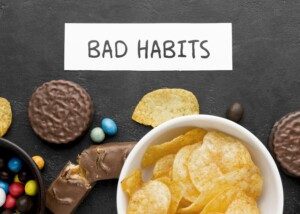To deny this is to deny reality. Call it what you wish (“moralizing”), but the hardcore fact is that some foods are good while others are just plain bad.
So yes, parents need to discuss the health of different kinds of foods with their kids.
That is extremely important, in this day and age of bizarre TikTok and Instagram influencers with morbid obesity instructing moms to avoid labeling food as bad or good and even to avoid altogether talking about healthful eating habits with their kids.
Why We Should “Moralize” Food
Notice that “moralize” is in quotes. That’s because when someone says a food is “bad,” they don’t mean in a moral sense; they mean in a what it can do to your body sense. It’s bad for the body.
However, social media influencers who celebrate morbid obesity have twisted this to make it seem as though food is being “moralized.”
They have made endless posts on Instagram and TikTok using that very term: moralized.
They will often also post, “Food has no moral value.” And yes, this is true: Food has no moral value.
What food has is HEALTH and BODY value.
- Is it healthful or unhealthful?
- Is it good for your body or bad for your body?
We should not feel guilty about discussing this with ourselves or with our kids.
There is not a single human on this planet for whom food intake does not affect their body.
A “Bad” Food Example

©Lorra Garrick
Foods with trans fats are bad because they’re bad for the body.
- This isn’t about morals.
- It’s about harmful substances.
Trans fats are harmful to the body primarily because they raise levels of low-density lipoprotein (LDL) cholesterol (the bad kind of cholesterol) — while lowering high-density lipoprotein (HDL) cholesterol, which is the beneficial type (Mozaffarian et al., 2006).
These changes increase the risk of cardiovascular disease.
Unlike naturally occurring fats, trans fats are artificially created through hydrogenation, a process that solidifies liquid oils.
This alteration changes how fats behave in the body, promoting inflammation throughout the body, and causing dysfunction of cells in blood vessels.
These two outcomes are heavily linked to heart disease.
A landmark study published in the New England Journal of Medicine found that a 2% increase in energy intake from trans fats was associated with a whopping 23% increase in the incidence of coronary heart disease (Mozaffarian, Katan, Ascherio, Stampfer & Willett, 2006).
Trans fats, also known as “partially hydrogenated” oil or “shortening,” have also been shown to impair insulin sensitivity and may increase the risk of type 2 diabetes (Koh-Banerjee et al., 2003).
Many countries have regulated or banned trans fats in processed foods.
The World Health Organization recommends eliminating industrially produced trans fats from the global food supply, citing their significant role in preventable heart disease deaths (WHO, 2018).
Come to think of it, foods with trans fats (commercially baked goods, meals in a box, frozen dinners and pizza, microwavable breakfasts, and so much more) should be labeled as immoral!
 Lorra Garrick is a former personal trainer certified by the American Council on Exercise. At Bally Total Fitness, where she was also a group fitness instructor, she trained clients of all ages and abilities for fat loss and maintaining it, muscle and strength building, fitness, and improved cardiovascular and overall health.
Lorra Garrick is a former personal trainer certified by the American Council on Exercise. At Bally Total Fitness, where she was also a group fitness instructor, she trained clients of all ages and abilities for fat loss and maintaining it, muscle and strength building, fitness, and improved cardiovascular and overall health.
.









































